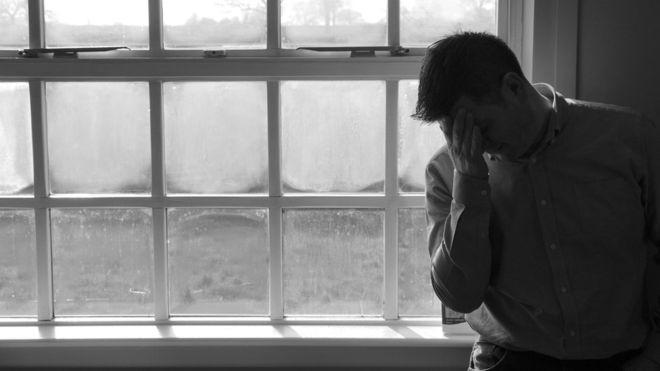In 2013, intentional self harm ranked 10th overall in the causes of death for males in Australia, and is the leading cause of death for males aged between 15 and 44. That fact is made even more alarming by the low rate at which men seek help - mirroring the reluctance of men to seek help for depression, or to seek help from a trained professional.
What are the signs, and how can you help?
Men actually do want help

Lead researcher and clinical psychologist Doctor Michael Player said in an interview with the ABC that "Men actually do want help. Unfortunately we don't have a really good dialogue or opportunity for men to talk about their mental health."
"This goes back to the way we have been brought up. We haven't had really good role models that have shown adequate ways to deal with mental health issues."
The study found that experiencing some or all of the following 4 factors are present in the development of suicidality.
1. A period of depressed or disrupted mood:
- Decreased motivation, poor concentration, and tiredness
- Irritability and agitation
- Disrupted sleep patterns
- Perceiving life events negatively
- Increase in anger and aggression
- Increase in social isolation
- Stereotypical "stoic" Aussie male belief system
- Being isolated by masculine beliefs (fear of imposing on others, perceived weakness of asking for help)
- Inability to manage emotions
- Feeling unable to live up to social expectations of happiness
- Sense of loss of control or feelings of guilt
- Fear of having these perceived weaknesses or failures revealed
- Expressing negative feelings physically, by hurting themselves, pushing themselves too far physically, or taking physical risks.
- Trying to hide being unwell in order to avoid the social stigma and labels
- Increased and excessive alcohol use, as well as other drugs
- Gambling and/or working excessively
- Expressing anger to avoid expressing sadness (or other emotion swaps)
- As a result of the above, men can become unable to cope with new stressors
- Events that are otherwise ordinary can accumulate to become overwhelming
- A seemingly small event can result in an actively suicidal state of mind
Men want to accept help

He acknowledged that there's a fine line between helping and being intrusive, but "if you notice something, you have to ask a question," he said.
Contrary to popular belief, talking about suicidal thoughts actually helps to alleviate them. Discussing suicide doesn't legitimise, normalise or encourage it. In fact, 92% of the people in the study felt better as a result of their participation in it.
So how to prevent it?
Remember that acute suicidality is a temporary state. Remember also that the indications above are things in peoples lives that enable a downward spiral in a person's ability to cope. If you notice that a friend or colleague has been experiencing some of the indications listed, and you are also aware of a sudden additional stress - something as simple as "I can't pay my rent" or "I'm going to be made redundant at work" (things that are bad, but are not worth losing your life over) - then ask the question.
The study suggests useful ways to interrupt a downward spiral, and assist a person to move away from a suicidal path.
- Listen with an open mind without judgement. Give positive feedback, and provide a sanctuary where distress is safe to experience.
- Social activities with trusted people - an opportunity to bond and to talk openly
- Simply turning up or phoning to say "Hi" and expressing your positive thoughts about the person, and your experience of them
- Normalise distress and assure him that his feelings are legitimate. Talking about suicide does not encourage suicide.
- Physical activities to help men get "out of their head"
- Involvement in volunteer-based activities, creating a sense of giving
- Regular contact with respected people.
- Encourage professional help
If a person is at a point where you think suicide may be likely, stay with them, remove their means to harm themselves, and talk about the impact of his suicide on others. With their consent, involve professionals and other trusted people in their lives.
If you are experiencing suicidal thoughts right now, call: Beyond Blue on 1300 22 4636 (24 hours a day, 7 days a week), Kids Helpline on 1800 55 1800, Lifeline Australia on 13 11 14, or Q-life (LGBTQI community) on 1800 184 527, or At Ease (Veterans and ADF)
Reference links:
- http://www.pedestrian.tv/news/arts-and-culture/a-study-has-now-identified-the-leading-causes-of-s/b9d6502a-6bc2-4a98-800b-a2cb3f48633e.htm
- http://www.abc.net.au/news/2015-06-25/suicide-study-by-black-dog-institute-looks-to-assist-men/6571258
- http://journals.plos.org/plosone/article?id=10.1371/journal.pone.0128180#sec026
- https://www.theguardian.com/news/datablog/2015/oct/20/what-were-dying-from-the-leading-causes-of-death-in-australia
- http://www.abs.gov.au/ausstats/[email protected]/Lookup/by%20Subject/3303.0~2013~Main%20Features~Leading%20Causes%20of%20Death%20by%20Sex~10036
Do you have any personal experience of suicidality? What what of the greatest help to you, or in what way was your help for someone most effective?


 RSS Feed
RSS Feed